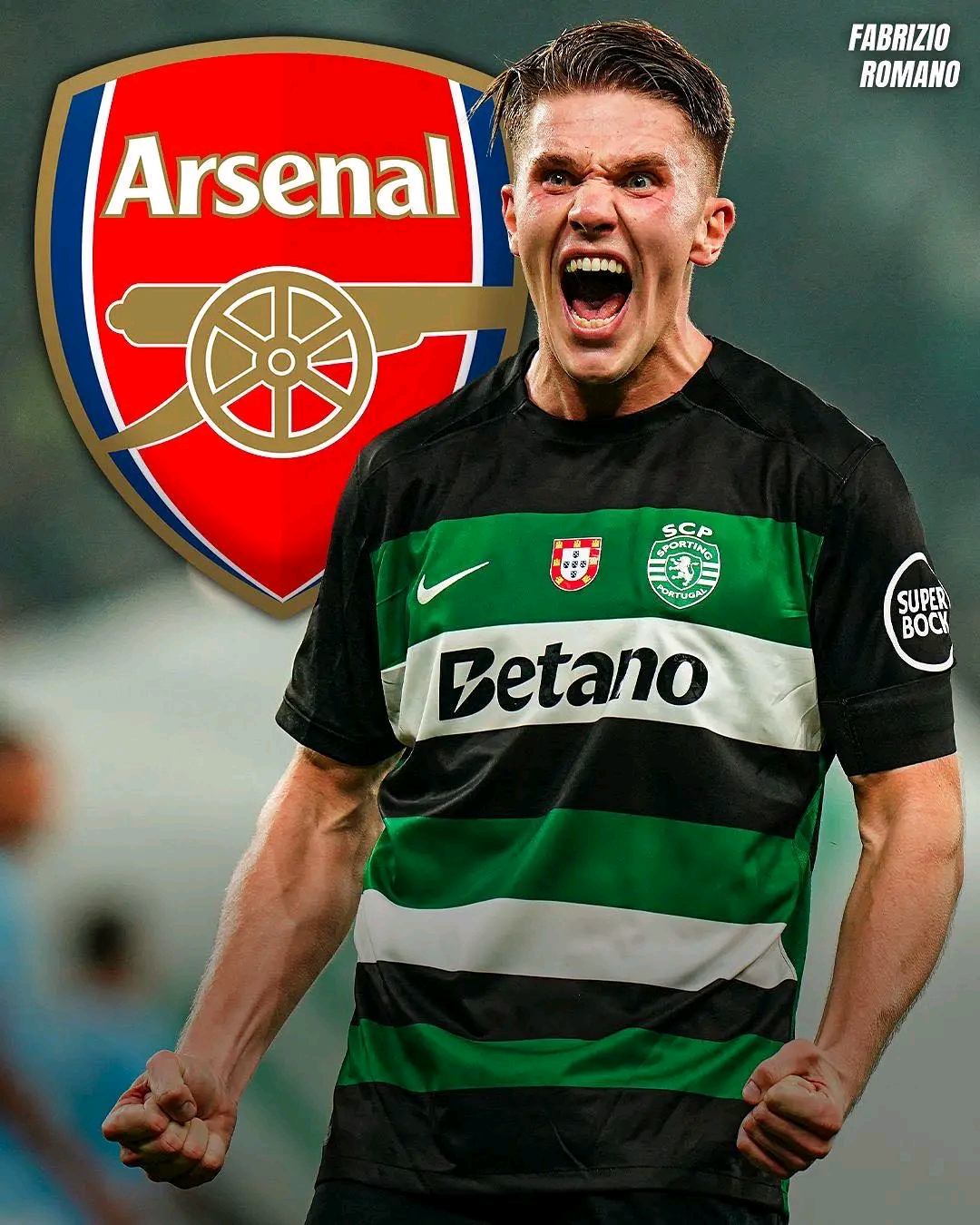Gyokeres just signed five years contract with Arsenal till 2030

The summer transfer window of 2025 has brought forth one of the most intriguing storylines in European football: Arsenal’s aggressive pursuit of Viktor Gyökeres, the Swedish striker who has taken Portuguese football by storm. As the Gunners continue their quest to return to the pinnacle of English football, the potential acquisition of Gyökeres represents more than just another transfer—it could be the missing piece in Mikel Arteta’s championship puzzle
According to reports from The Athletic, Arsenal have moved into advanced negotiations with Sporting CP for the services of Viktor Gyökeres, with personal terms already agreed between the club and the player on a comprehensive five-year deal. The urgency surrounding this transfer reflects Arsenal’s determination to address their long-standing striker conundrum before the squad returns to pre-season training in July.
The north London club’s interest in Gyökeres comes after their pursuit of RB Leipzig’s Benjamin Sesko hit a stumbling block. The German club’s unwillingness to lower their asking price for the 22-year-old Slovenian international forced Arsenal to pivot their attention toward the Swedish goal machine. This strategic shift demonstrates the pragmatic approach of Andrea Berta, Arsenal’s new Sporting Director, who has been a long-time admirer of Gyökeres and appears determined to secure his signature.
Manager Mikel Arteta is reportedly pushing for a swift conclusion to negotiations, understanding that the early acquisition of his primary striking target could prove crucial for the team’s pre-season preparations and overall campaign planning. The Spanish tactician’s urgency reflects the lessons learned from previous transfer windows where delayed signings impacted the team’s early-season performance.
Viktor Gyökeres’ journey from Championship football to European prominence reads like a modern football fairytale. Signed by Sporting CP from Coventry City in 2023 for €24 million, the Swedish striker has exceeded every expectation, transforming from a promising English second-tier player into one of Europe’s most feared goalscorers.
The statistics surrounding Gyökeres’ Portuguese adventure are nothing short of extraordinary. In 66 league appearances across two seasons, he has netted 68 goals—a strike rate that surpasses even the most optimistic projections. To put this achievement in perspective, no player in Europe’s top-10 leagues has scored more goals than Gyökeres during this period. Bayern Munich’s Harry Kane, widely regarded as one of the world’s premier strikers, comes closest with 62 goals, but even the English captain falls short of the Swedish sensation’s remarkable tally.
This prolific output has seen Gyökeres’ market value skyrocket to €75 million, representing a remarkable return on investment for Sporting CP. The Portuguese club’s shrewd acquisition has not only provided them with a genuine superstar but also positioned them to command a significant transfer fee that could fund their operations for years to come.
While Gyökeres’ goal-scoring statistics are undeniably impressive, a deeper analysis reveals important contextual factors that potential suitors must consider. Of his 68 league goals, 17 have come from the penalty spot—a significant portion that highlights his reliability from twelve yards but also suggests that his open-play goal tally, while still exceptional, may not be quite as dominant as the headline figure suggests.
The distinction between penalty goals and open-play strikes becomes particularly relevant when assessing how a player might adapt to a new league, especially one as physically demanding and tactically sophisticated as the Premier League. Penalty conversion rates tend to be more consistent across different leagues, while open-play goals often require greater adaptation to new tactical systems, defensive approaches, and overall game tempo.
Furthermore, Gyökeres’ entire professional career has been spent outside Europe’s elite leagues. His journey has taken him from Swedish football to the English Championship, and then to Liga Portugal—all respectable competitions, but none matching the intensity, pace, and defensive sophistication of the Premier League. This lack of top-five league experience represents both a risk and an opportunity for Arsenal.
The quality differential between Liga Portugal and the Premier League represents one of the most significant factors in assessing Gyökeres’ potential impact at Arsenal. While the Portuguese league has produced numerous world-class talents and maintains a respectable UEFA coefficient ranking, the Premier League’s status as the world’s most competitive and financially powerful division creates unique challenges for incoming players.
Liga Portugal’s tactical approach often favors more open, attacking football, which can inflate goal-scoring statistics for prolific strikers. The league’s defensive standards, while improving, do not consistently match the Premier League’s relentless pressing, sophisticated tactical systems, and athletic intensity. This disparity doesn’t diminish Gyökeres’ achievements but rather contextualizes them within a framework that Arsenal’s decision-makers must carefully consider.
However, the Portuguese league’s technical emphasis and tactical sophistication should not be underestimated. Players who succeed in Liga Portugal often possess the technical skills and tactical awareness necessary to adapt to higher levels of competition. Gyökeres’ success in Portugal suggests a player with the fundamental attributes needed for Premier League success, even if the transition may require time and tactical adjustment
One of the most compelling arguments for Gyökeres’ potential success at Arsenal lies in Mikel Arteta’s proven ability to adapt players to new roles and maximize their strengths within his tactical system. The Spanish manager’s track record of positional transformation provides reason for optimism regarding the Swedish striker’s integration.
The most notable example of Arteta’s tactical flexibility has been his handling of Kai Havertz. The German midfielder, who had struggled to find his optimal position since joining Chelsea, has been successfully converted into a false nine/striker hybrid under Arteta’s guidance. This transformation required not only tactical acumen but also the ability to communicate complex positional concepts to a player adapting to an entirely new role.
Similarly, Arteta’s ability to extract effective performances from Mikel Merino in advanced positions demonstrates his tactical versatility and player development skills. If the Arsenal manager can successfully deploy midfielders as effective attacking threats, the prospect of working with a natural goalscorer like Gyökeres becomes even more enticing.
Arteta’s tactical system, built around positional play, fluid movement, and collective pressing, could provide the perfect framework for Gyökeres to thrive. The Swedish striker’s physical presence, combined with his demonstrated ability to find space in the penalty area, aligns well with Arsenal’s crossing patterns and creative midfield play
At 27 years old, Viktor Gyökeres finds himself at a crucial juncture in his career. This age presents both advantages and challenges for Arsenal’s potential investment. On the positive side, 27 represents the theoretical peak years for a striker—old enough to have developed tactical maturity and physical strength, yet young enough to maintain pace and athleticism.
However, the age factor also intensifies the pressure for immediate success. Unlike a younger prospect who might be afforded time to adapt and develop, Gyökeres would be expected to make an immediate impact at Arsenal. The club’s championship aspirations demand results now, not in two or three seasons’ time. This expectation creates a high-pressure environment that could either inspire the Swedish striker to greater heights or prove overwhelming.
The financial investment required to secure Gyökeres’ services—likely in the region of €75-80 million—further amplifies these expectations. Arsenal’s supporters and management will expect a return on investment that justifies the significant expenditure, particularly given the club’s recent history of mixed transfer outcomes.
Arsenal’s pursuit of Gyökeres must be understood within the context of their long-standing striker situation. The departure of Pierre-Emerick Aubameyang and the inconsistent goal-scoring contributions from various attacking players have left the club searching for a reliable, prolific number nine.
The Gunners’ recent tactical evolution under Arteta has seen them compete at the highest level in both domestic and European competitions. However, their inability to convert dominance into goals has often proved costly in crucial moments. The 2023-24 and 2024-25 seasons saw Arsenal accumulate impressive point totals and playing statistics, yet fall short of major trophies partly due to goal-scoring inconsistencies.
Gabriel Jesus, while technically gifted and tactically intelligent, has struggled with injury issues and goal-scoring consistency. Eddie Nketiah showed promise but lacked the physical presence and clinical finishing required for sustained success at the highest level. The club’s reliance on converted midfielders and false nine systems, while tactically interesting, highlighted the absence of a genuine goal-scoring threat. Gyökeres represents a potential solution to this puzzle—a striker who combines physical presence with clinical finishing and has demonstrated the ability to perform consistently over extended periods. His goal-scoring record suggests the reliability that Arsenal have been seeking.
From Sporting CP’s perspective, the potential sale of Viktor Gyökeres represents a remarkable business success story. The Portuguese club’s €24 million investment in 2023 could yield returns of more than triple the initial outlay, providing substantial funds for squad reinforcement and infrastructure development.
Sporting’s position in these negotiations is strengthened by Gyökeres’ contract situation, which runs until 2028, and their recent success in both domestic and European competitions. The club is under no immediate pressure to sell, allowing them to demand premium pricing for their star asset. The Portuguese club’s strategy of developing and selling talent has been refined over many years, with previous successful sales including Bruno Fernandes to Manchester United and João Palhinha to Fulham. This experience in high-profile negotiations provides them with the expertise to maximize the value of the Gyökeres transfer.
Arsenal’s shift from Benjamin Sesko to Viktor Gyökeres offers an interesting study in transfer strategy and target assessment. Sesko, at 22, represents a longer-term investment with higher upside potential but also greater risk. His physical attributes and technical skills suggest a player who could develop into a world-class striker, but his relative inexperience and inconsistent goal-scoring record raise questions about immediate impact.
Gyökeres, conversely, offers a more immediate solution with proven goal-scoring ability and tactical maturity. While his ceiling might be lower than Sesko’s, his floor is significantly higher, making him a safer investment for a club seeking immediate championship contention. The financial considerations also differ significantly. RB Leipzig’s reluctance to lower their asking price for Sesko likely reflected their belief in his long-term value and their strong financial position. Sporting CP, while not under pressure to sell, may be more amenable to negotiations given the life-changing money involved for both club and player.
The Premier League’s history is littered with examples of prolific goal-scorers from other leagues who struggled to replicate their success in English football. The physical demands, tactical sophistication, and relentless pace of the English top flight have challenged even the most accomplished international strikers.
However, there are also numerous success stories that provide hope for Gyökeres’ potential adaptation. Players like Erling Haaland, Mohamed Salah, and Sergio Agüero have successfully transitioned from other leagues to become Premier League legends. The key factors in these success stories often include physical adaptation, tactical flexibility, and strong support systems within their new clubs.
Gyökeres’ physical attributes suggest he possesses the strength and aerial ability to compete effectively in Premier League football. His goal-scoring record indicates the tactical intelligence and positioning skills necessary for success at the highest level. The question remains whether he can adapt quickly enough to meet Arsenal’s immediate expectations.
Arsenal’s pursuit of Gyökeres must be evaluated within their broader strategic objectives. The club’s recent progress under Arteta has reestablished them as genuine title contenders, but the final step toward championship success has proved elusive. The addition of a proven goal-scorer could provide the marginal gains necessary to push them over the finish line.
The Premier League’s competitive landscape in 2025 presents both opportunities and challenges for Arsenal. Manchester City’s continued dominance, Liverpool’s resurgence, and the financial power of clubs like Chelsea and Manchester United create a highly competitive environment where every transfer decision carries significant implications. Gyökeres’ potential arrival would signal Arsenal’s serious intent to compete for major honors. The financial commitment required demonstrates the club’s willingness to invest in proven talent rather than relying solely on development and tactical innovation.
Viktor Gyökeres’ potential transfer to Arsenal represents one of the most intriguing storylines of the 2025 transfer window. His remarkable goal-scoring record in Portugal, combined with Arsenal’s tactical sophistication and Arteta’s player development skills, creates the foundation for potential success. The challenges are real and significant. The step up from Liga Portugal to the Premier League is substantial, and the expectations placed on a €75 million striker are enormous. However, the potential rewards—both for player and club—are equally significant.
For Arsenal, Gyökeres represents more than just a goal-scorer; he symbolizes their ambition to return to the summit of English football. For the Swedish striker, the move offers the opportunity to test himself at the highest level and potentially establish himself among Europe’s elite forwards.
The coming weeks will determine whether this transfer materializes, but the implications extend far beyond a single player move. Success could catalyze Arsenal’s championship ambitions, while failure could set back their progress for years. In the high-stakes world of Premier League football, the Viktor Gyökeres transfer represents both the potential for glory and the risk of disappointment—the essence of football’s eternal drama.















